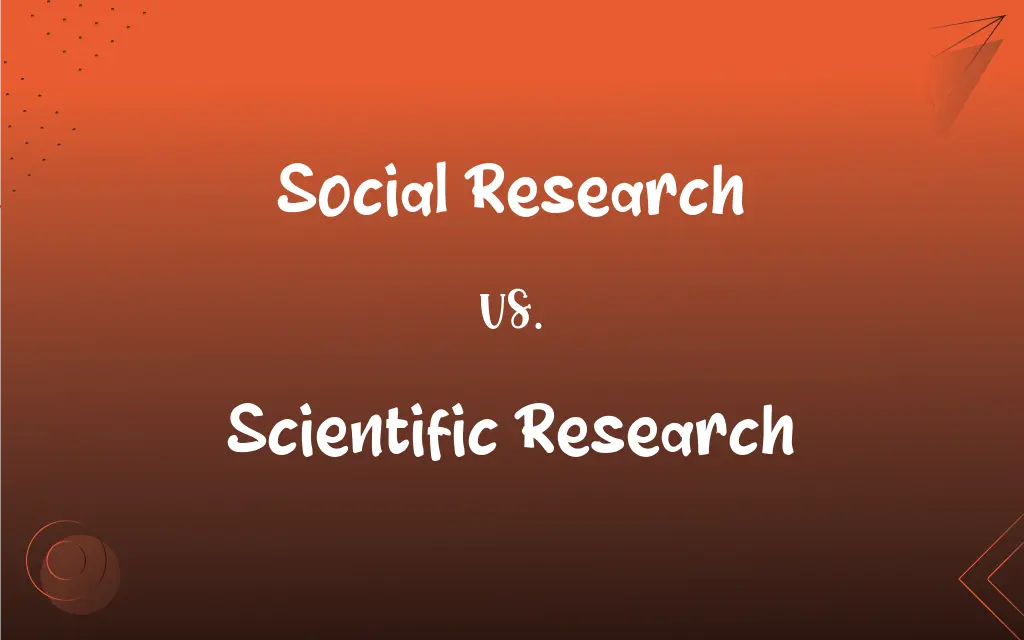Social Research vs. Scientific Research: What's the Difference?
Edited by Aimie Carlson || By Harlon Moss || Published on January 14, 2024
Social research explores human society and relationships, while scientific research focuses on empirical, systematic study of the natural world.

Key Differences
Social research primarily investigates human society, behaviors, and cultural norms, using methodologies like surveys and ethnography. Conversely, scientific research delves into natural sciences, employing rigorous, experimental methods to study phenomena in disciplines like physics and biology.
Social research often adopts qualitative methods to understand social dynamics, motivations, and perspectives, emphasizing subjective interpretations. In contrast, scientific research predominantly relies on quantitative approaches, emphasizing objectivity and measurement to test hypotheses in areas like chemistry and astronomy.
Social research is typically interpretive, aiming to understand the complexity of human experiences and social structures. On the other hand, scientific research seeks to establish universal laws and theories through controlled experiments and observations in fields like ecology and genetics.
In social research, data collection methods include interviews, focus groups, and participant observation, prioritizing human experiences and societal contexts. Scientific research, however, often involves laboratory experiments, field observations, and mathematical modeling, focusing on empirical data and reproducibility.
Social research is integral in fields like sociology, anthropology, and political science, shaping social policies and understanding. Whereas, scientific research underpins technological advancements and theoretical understanding in areas such as physics, chemistry, and biology.
ADVERTISEMENT
Comparison Chart
Primary Focus
Human society and interactions
Natural world and physical phenomena
Methodology
Qualitative, interpretive methods
Quantitative, empirical methods
Objective
Understanding human behavior and culture
Establishing universal laws and theories
Data Collection
Interviews, surveys, ethnography
Experiments, observations, modeling
Key Disciplines
Sociology, anthropology, political science
Physics, biology, chemistry
ADVERTISEMENT
Social Research and Scientific Research Definitions
Social Research
Social research interprets social interactions and structures.
Social research showed how social media impacts youth self-esteem.
Scientific Research
It involves systematic experimentation and observation.
Scientific research in genetics paved the way for gene editing techniques.
Social Research
It employs methods like surveys and ethnography.
A social research project used surveys to gauge public opinion on climate change.
Scientific Research
Scientific research underpins technological advancements.
Scientific research was crucial in creating the latest smartphone technology.
Social Research
It involves qualitative analysis of social phenomena.
Through social research, anthropologists decoded the rituals of an indigenous tribe.
Scientific Research
Scientific research investigates natural and physical phenomena.
Scientific research led to the discovery of a new planet's orbit.
Social Research
Social research studies human societies and behaviors.
Social research on voting patterns revealed cultural influences on political choices.
Scientific Research
Scientific research seeks to establish empirical evidence.
Through scientific research, physicists confirmed the existence of gravitational waves.
Social Research
Social research contributes to societal policy making.
Social research influenced new policies in urban housing development.
Scientific Research
It often uses quantitative methods and laboratory testing.
Scientific research in chemistry developed a new synthetic polymer.
FAQs
What methods are used in social research?
Methods include surveys, interviews, and participant observation.
What are common methods in scientific research?
Experiments, observations, and modeling are typical.
What is scientific research?
It's the systematic study of the natural world through empirical methods.
How does social research differ from scientific research?
Social research focuses on human societies, while scientific research focuses on natural phenomena.
Is scientific research always conducted in a lab?
Not always; it can also include fieldwork and theoretical research.
What's a typical scientific research topic?
Investigating new treatments for diseases in a lab setting.
What is social research?
It's the study of societies, cultural norms, and human behaviors.
Can social research be quantitative?
Yes, it can use quantitative methods like surveys and statistics.
Can social research influence policy?
Yes, it often informs and shapes public policy.
What role does data play in scientific research?
Data is crucial for testing hypotheses and drawing conclusions.
What skills are important for social researchers?
Skills like qualitative analysis, interviewing, and empathy.
What's an example of a topic in social research?
Examining the impact of social media on mental health.
How is objectivity maintained in scientific research?
Through controlled experiments and peer review.
How do ethics play a role in social research?
Ethics are key in ensuring participant consent and confidentiality.
What skills are vital for scientific researchers?
Skills in experimentation, quantitative analysis, and critical thinking.
Is collaboration common in scientific research?
Yes, especially in large-scale or interdisciplinary projects.
Are the results of social research subjective?
They can be, due to the interpretive nature of social phenomena.
What impact does social research have on society?
It helps understand and improve societal structures and relationships.
Are there ethical considerations in scientific research?
Yes, particularly regarding environmental impact and human safety.
Can social research be interdisciplinary?
Absolutely, it often overlaps with psychology, economics, etc.
About Author
Written by
Harlon MossHarlon is a seasoned quality moderator and accomplished content writer for Difference Wiki. An alumnus of the prestigious University of California, he earned his degree in Computer Science. Leveraging his academic background, Harlon brings a meticulous and informed perspective to his work, ensuring content accuracy and excellence.
Edited by
Aimie CarlsonAimie Carlson, holding a master's degree in English literature, is a fervent English language enthusiast. She lends her writing talents to Difference Wiki, a prominent website that specializes in comparisons, offering readers insightful analyses that both captivate and inform.






































































